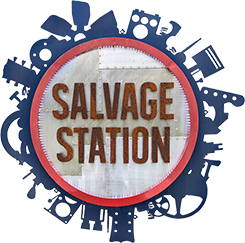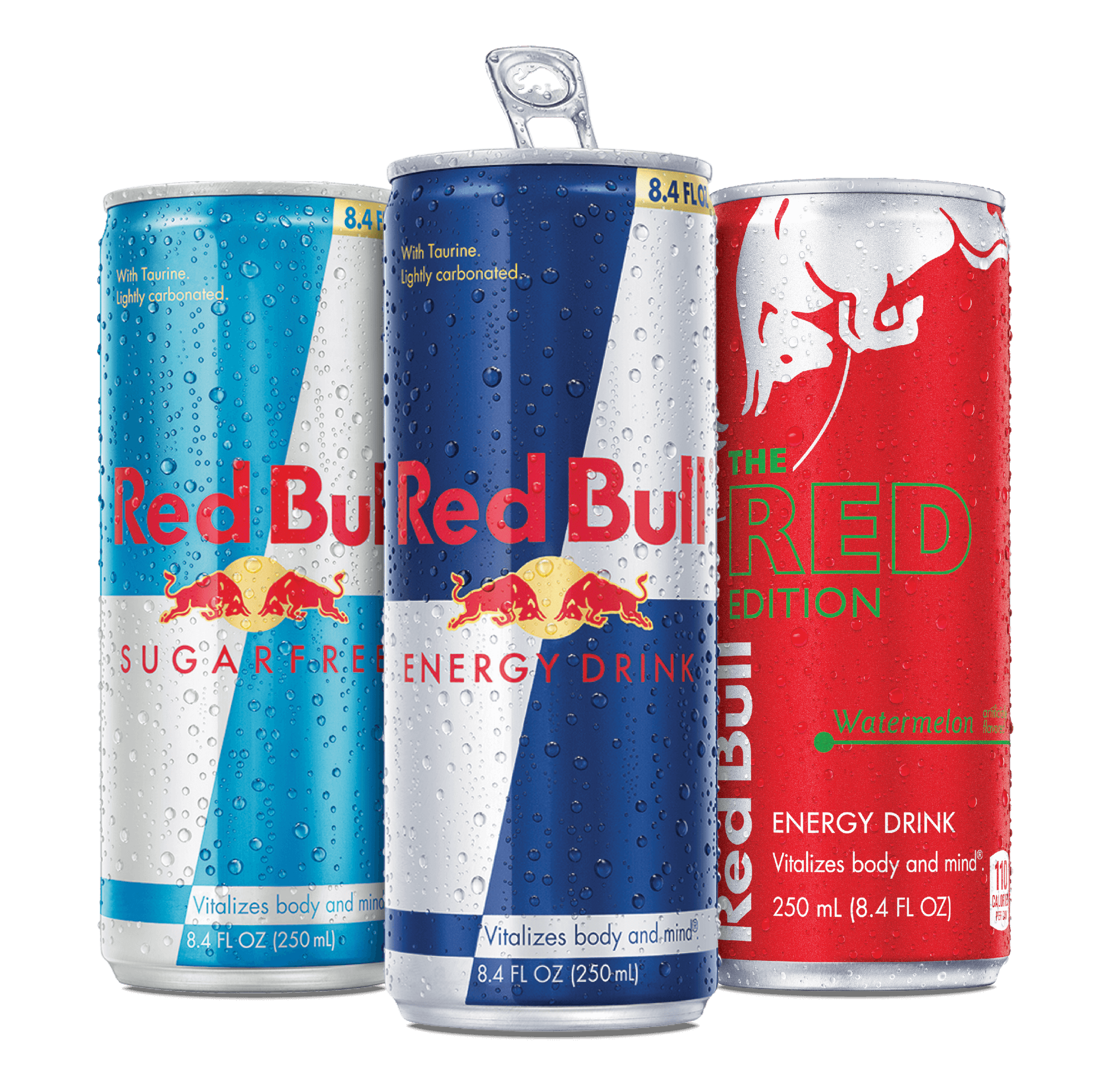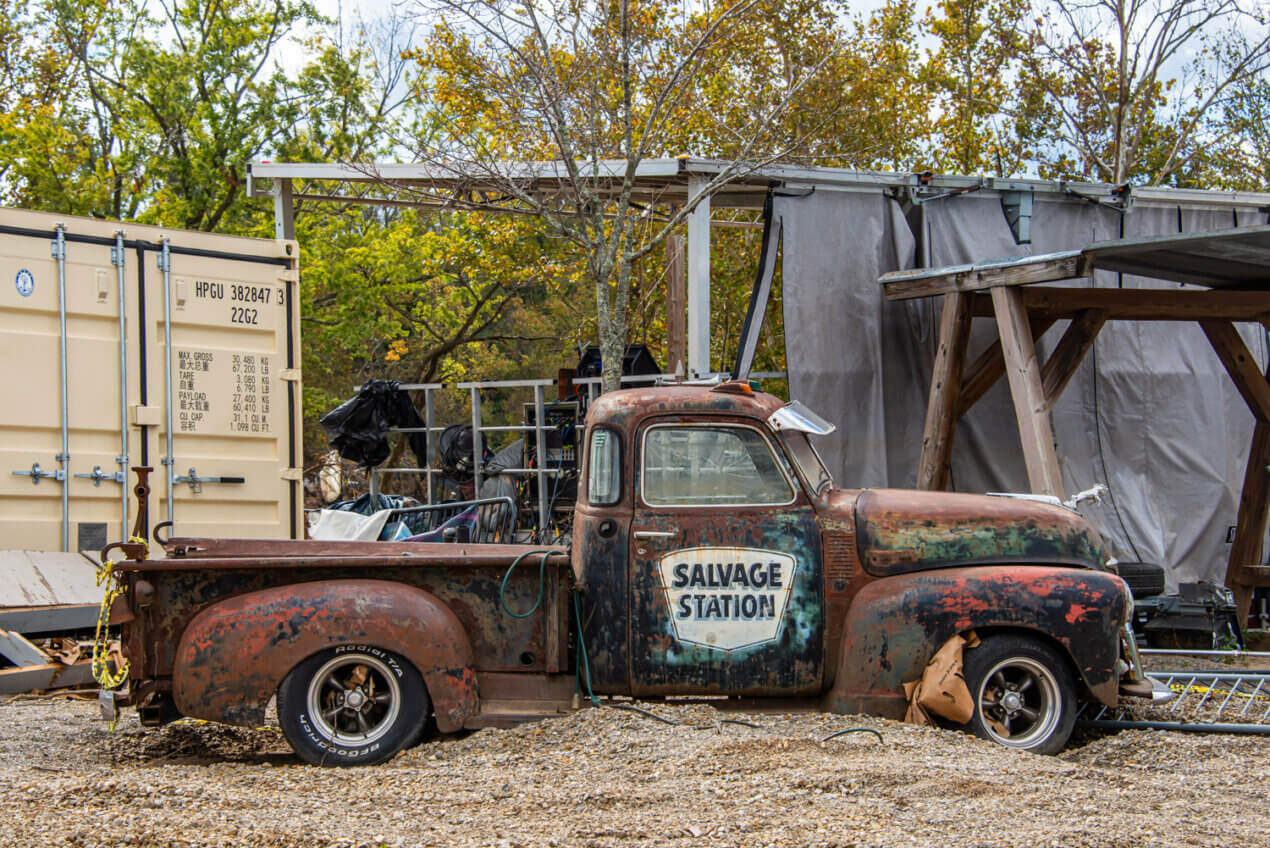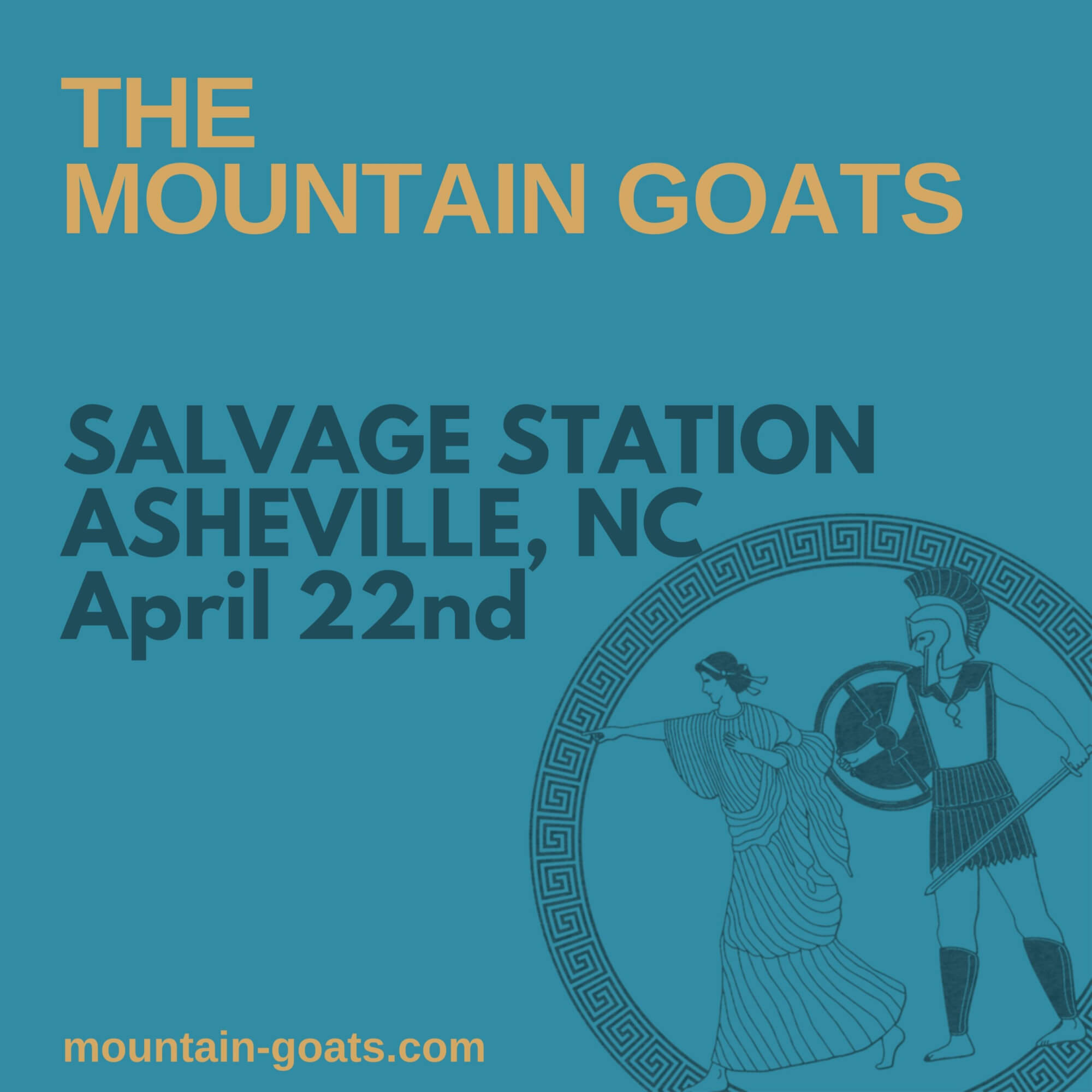
The Mountain Goats
with Katy Kirby
DOORS: 7:00 PM
STARTS: 8:00 PM
Live on the Indoor Stage
Genre: Indie FolkAge Limit: Must be 18 or Older
Free Parking; No Refunds
On-site parking is FREE.
Listen to The Mountain Goats:
About The Mountain Goats:
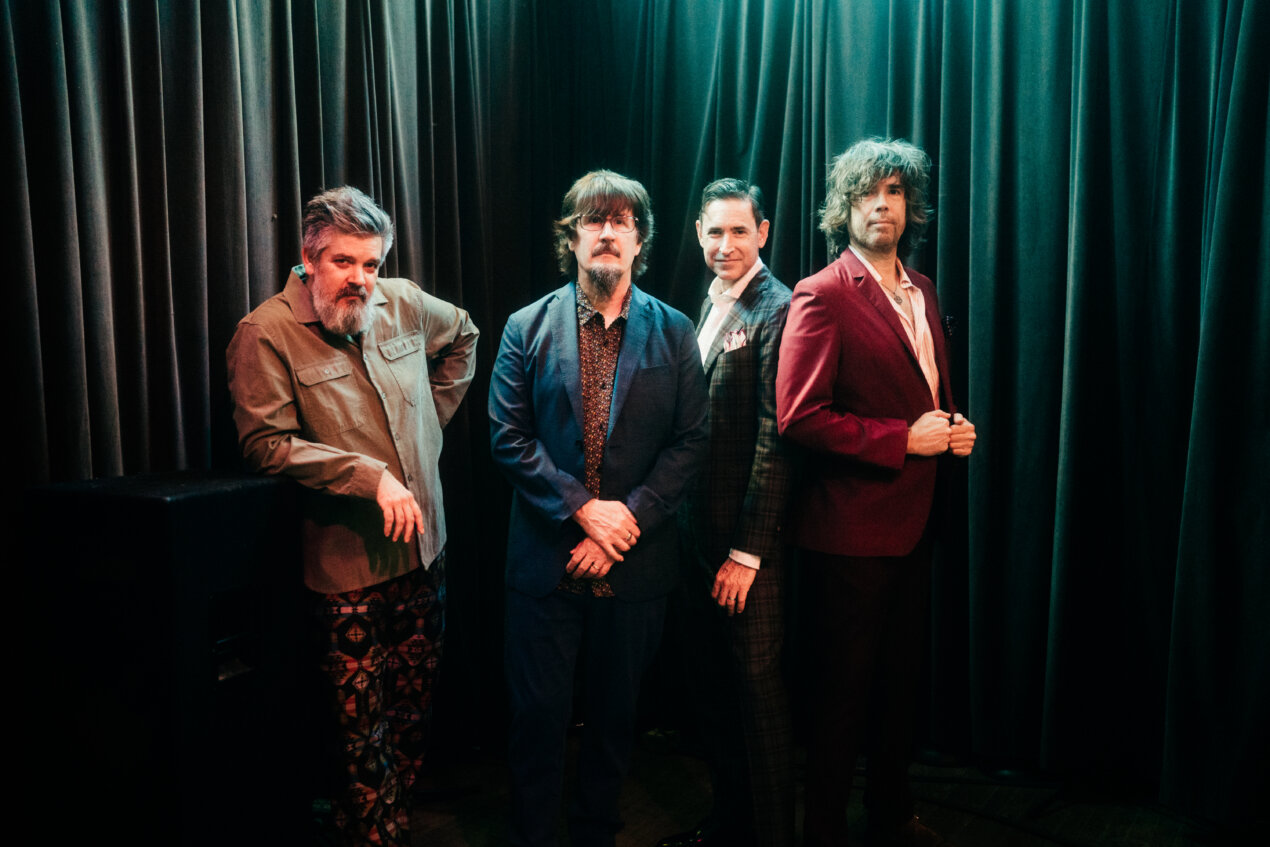
Jenny from Thebes began its life as many albums by the Mountain Goats do, with John Darnielle
playing the piano until a lyric emerged. That lyric, “Jenny was a warrior / Jenny was a thief / Jenny hit
the corner clinic begging for relief,” became “Jenny III,” a song which laid down a challenge he’d never
taken up before: writing a sequel to one of his most beloved albums.
The Mountain Goats’ catalog is thick with recurring characters—Jenny, who originally appears in the
All Hail West Texas track bearing her name, as well as in “Straight Six” from Jam Eater Blues and
Transcendental Youth side two jam “Night Light,” is one of these, someone who enters a song
unexpectedly, pricking up the ears of fans who are keen on continuing the various narrative threads
running through the Mountain Goats’ discography before vanishing into the mist. In these songs, Jenny
is largely defined by her absence, and she is given that definition by other characters. She is running
from something. These features are beguiling, both to the characters who’ve told her story so far and to
the listener. They invite certain questions: Who is Jenny, really? What is she running from? Well, she’s a
warrior and a thief, and, this being an album by the Mountain Goats, it’s a safe bet whatever she’s
fleeing is something bad. Something catastrophically bad.
Jenny from Thebes is the story of Jenny, her southwestern ranch style house, the people for whom that
house is a place of safety, and the west Texas town that is uncomfortable with its existence. It is a story
about the individual and society, about safety and shelter and those who choose to provide care when
nobody else will. This is what a follow-up to All Hail West Texas entails. But if you think about the Mountain Goats as they were in 2001, when Darnielle wrote and recorded that album on his own, mostly into his Panasonic RX-FT500 boombox, and how they are now as the recording and touring outfit of Darnielle, Peter
Hughes, Matt Douglas, and Jon Wurster, you may find yourself asking how. That occurred to Darnielle,
too.
“If we’re going to do a sequel to a record that was recorded almost entirely on a boombox,” he asks,
“why not do the opposite and make it as big as possible?”
Decamping to Tulsa, Oklahoma’s legendary The Church Studio with Grammy-winning
producer/engineer Trina Shoemaker (Sheryl Crow’s The Globe Sessions), that is exactly what the
Mountain Goats did. Jenny from Thebes is a lush collection of showtunes, pushing Darnielle as a vocalist
and the Mountain Goats as a band, broadening their sonic palette once again by leaning into influences
like Godspell, Jim Steinman, and The Cars. The resulting album cuts a path that is simultaneously full of
allusions longtime Mountain Goats fans will spin entire mythologies from while also being their most
inviting record for those who’ve yet to be converted to the cause.
Lifted by Matt Douglas’ horn and string arrangements, the dreamy guitar of Bully leader (and Bleed Out
producer) Alicia Bognanno, and backing vocals from Kathy Valentine of The Go-Go’s (“Only One Way,”
“Same as Cash,” “Going to Dallas”) and Matt Nathanson (“Fresh Tattoo”), Jenny from Thebes is a
widescreen musical in scope, a melodrama of richly detailed characters and sweeping emotions.
The west Texas the Mountain Goats conjure for Jenny is huge and already crumbling to the ground
when we meet her in lead single “Clean Slate,” where a new arrival to the safehouse finds it nearly full,
his host beyond exhaustion. Her burdens are heavy, and the measures they cause her to take have
consequences that scale well beyond anything she could have anticipated when she decided to open
her home to others. Such gestures are noble and doomed.
“You can’t be the person everyone relies on to take care of them and keep them safe for too long,”
Darnielle says of the reality of these spaces. “It eventually causes so much stress that it threatens to
break you.”
Ironically, that same stress makes it impossible for Jenny to see that she’s on the verge of being broken
until it’s too late. Explaining the title of the album, Darnielle notes that Jenny is not unlike a character
from Greek literature, someone on the verge of an unimaginable tragedy whose signs and portents will
not make themselves known to her until she finds herself amidst the wreckage. “These things never
happen in isolation,” he says. “One bad event leads to and is the reason for another bad event. Jenny
should know that you can’t keep a safehouse in a west Texas town, but she’s too wrapped up in the
process and has to go through the loss to understand how it happened.”
Whether or not she comes to understand how it happened, the events of Jenny from Thebes set Jenny
on the run. A woman and her custom yellow and black Kawasaki held in the memories of a vanishing
few, someone who held the gate for as long as she could, as a warrior might, before disappearing into
the night like a thief.
Listen to Katy Kirby:
About Katy Kirby:

Let’s face it: There’s no such thing as “real life”. There is only experience and the negotiations we undertake in order to share it with other people. On her second album Blue Raspberry, the New York-based songwriter Katy Kirby dives headlong into the artifice of intimacy: the glitter smeared across eyelid creases, the smiles switched on with an electric buzz, the synthetic rose scent all over someone who’s made herself smell nice just for you. An exegesis of Kirby’s first queer relationship, Blue Raspberry traces the crescendo and collapse of new love, savoring each gleaming shard of rock candy and broken glass along the way.
Originally from Spicewood, Texas, Kirby was living in Nashville when she started writing Blue Raspberry’s title track, the first of the album’s songs to take shape. “‘Blue Raspberry’ is the oldest song on the record. I began to write it a month or so before I realized, I think I’m queer,” she says. “There’s a tradition of yearning in country love songs. I like the male yearning songs better, usually. I started writing ‘Blue Raspberry,’ and I was thinking about, if I was in love with a woman, what would I love about her? Especially if she was someone that I couldn’t touch, but that I was pining for. What would I be caught on? And I thought that I would probably be particularly charmed by the choices she made on how to look after she woke up in the morning. I thought about tackiness, and the ways that’s a dirty word. That’s where the title comes from—loving someone for those choices, for the artificiality.”
Blue Raspberry follows Kirby’s acclaimed debut album Cool Dry Place, which was also recorded in Nashville and released in February of 2021. While the songs on that record unfold amidst Kirby finding her voice, Blue Raspberry is a polished and confident sophomore effort that deepens the questions that bubbled through Cool Dry Place about how people can reach each other despite all the hazard zones where human connection caves in.
After realizing that her romantic interest in women went beyond the confines of a songwriting exercise, Kirby kept writing songs that sought to untangle that false binary between the real and the fake, to celebrate the spectacles people put on for each other when they’re falling in and out of love. She committed herself completely to the work of drawing out these songs, often stealing away to her van to write immediately after playing an opening set while on a 2021 tour with Waxahatchee. For the first time since she started writing songs, Kirby stopped tamping down on her impulse to craft ornate, generously embellished music. “I felt less embarrassed about just wanting to write really gorgeous songs,” she says. She started weaving more intricate chord progressions and melodies into her work, and in turn she felt emboldened to hold onto the more baroque flourishes of her lyrics without whittling them down into plainer lines.
Many of the songs that make up Blue Raspberry stemmed from a single page of lyrical fragments, words and phrases that kept their hold on Kirby even as she slipped them into multiple settings. Images repeat on different songs throughout the album: cubic zirconia gleaming at a woman’s throat, the lab-grown substitute indistinguishable from earth-crushed diamonds; salt crystallizing as seawater dries on reddened skin; teeth that shine in a grin and then bite till they bruise. These refrains and reprises lend a tight narrative cohesion to the record, elevating its sharp queries into all the unlikely shapes love takes as it surges through you.
To underscore Blue Raspberry’s lyrical themes, Kirby worked with her band to develop a newly lush sonic palette replete with orchestral gestures arranged by her friend Rowen Merrill. “I felt like I was intending to write love songs for the first time. Once I realized they were queer love songs and celebrating artificiality, I wanted them to sound like they were bidding for a spot in the wedding reception canon,” she says. “It was more fun to just go for it than to try to restrain ourselves. Especially if we were just accepting the fact that we were trying to make objectively beautiful music, whatever that means.”
Together with producers Alberto Sewald and Logan Chung, Kirby looked to albums like Andy Shauf’s The Party and Lomelda’s Hannah as models for Blue Raspberry’s abundant but spacious gorgeousness. Piano and strings echo together on the gentle ballad “Salt Crystal,” while scrapes of cello punctuate each heartbroken line of “Alexandria,” a song about the dissolution of Kirby’s first queer relationship and recorded live in one take. Cymbals and organs stagger across the offbeat “Drop Dead,” one of the album’s most playful songs that highlights the sly humor in Kirby’s lyrics: “There’s no virgin territory for a body like hers.” On the album’s title track, Kirby sings trailed by a pitch-lowered echo of her own voice, her guitar chords hanging in the air like question marks. Her imagery seizes upon the bright, garish colors of mass-produced material, homing in on its sensory intensity while casting aside any judgment about its source. “Her eyes burn white as Styrofoam right into me,” she sings, rendering a cheap, disposable substance into shocking magic.
“Why wouldn’t that be enough?” Kirby sings throughout the album, a question that’s never answered and never drops. Every attempt at love strains toward the idea of the real thing, that totalizing force that makes everything around it perfect forever. But if no one ever gets there, why wouldn’t the straining itself suffice? Blue Raspberry shivers with the idea that the key to the treasure is itself the treasure—even if it’s plastic, even if its gold coating flakes off at your touch, even if despite all your searching you never find the lock.
WNCW is a media sponsor.

DAY OF SHOW INFORMATION:
PARKING: DO NOT park along the railroad tracks, bike lanes, or at other businesses along Riverside Drive! YOU WILL BE TOWED! FREE ON-SITE parking is available for this event.
AGE LIMIT: 18+ only (no exceptions!)
REQUIRED: Shirts + shoes are required at all times while on property (this used to be a salvage yard and can be very dangerous for bare feet).
FOOD/BEVERAGE: We will have Root Down Kitchen open with options for everyone, so come hungry! Please, no outside food, drinks are allowed into the venue. Multiple full bars will be open with an incredible selection of alcoholic and non-alcoholic options. EMPTY water bottles are allowed in an effort to cut down on waste. Remember to reduce, reuse and recycle and LEAVE NO TRACE (aka- put your used items in the proper bins when done).
BAG POLICY: ALL guests are subject to being searched prior to entry. No large bags or backpacks allowed into the venue. For fastest entry, bring a small, clear bag for your personal belongings.
THE FOLLOWING ARE NOT ALLOWED INSIDE THE VENUE:
-No Pets or Animals
-No camping chairs or blankets
-No firearms, knives, weapons, pepper spray, fireworks, or projectiles of any kind
-No drugs, drug paraphernalia, or illegal substances of any kind
-No personal video cameras, Go-Pros, drones, or lasers
-No professional audio, video, or audio recording equipment – (including detachable lenses, tripods, zooms, or commercial use rigs) without proper credentials
-No inflatables
-No tents or easy-ups
-No frisbees, hula hoops, or balls
Check out our FAQ page here to learn more.
CDC guidelines + band requirements + our venue policies are subject to change daily, so please keep your eyes on https://salvagestation.com/covid-policy/ for updates. We do not issue refunds based on our Covid-19 policies and reserve the right to change them at any time.
